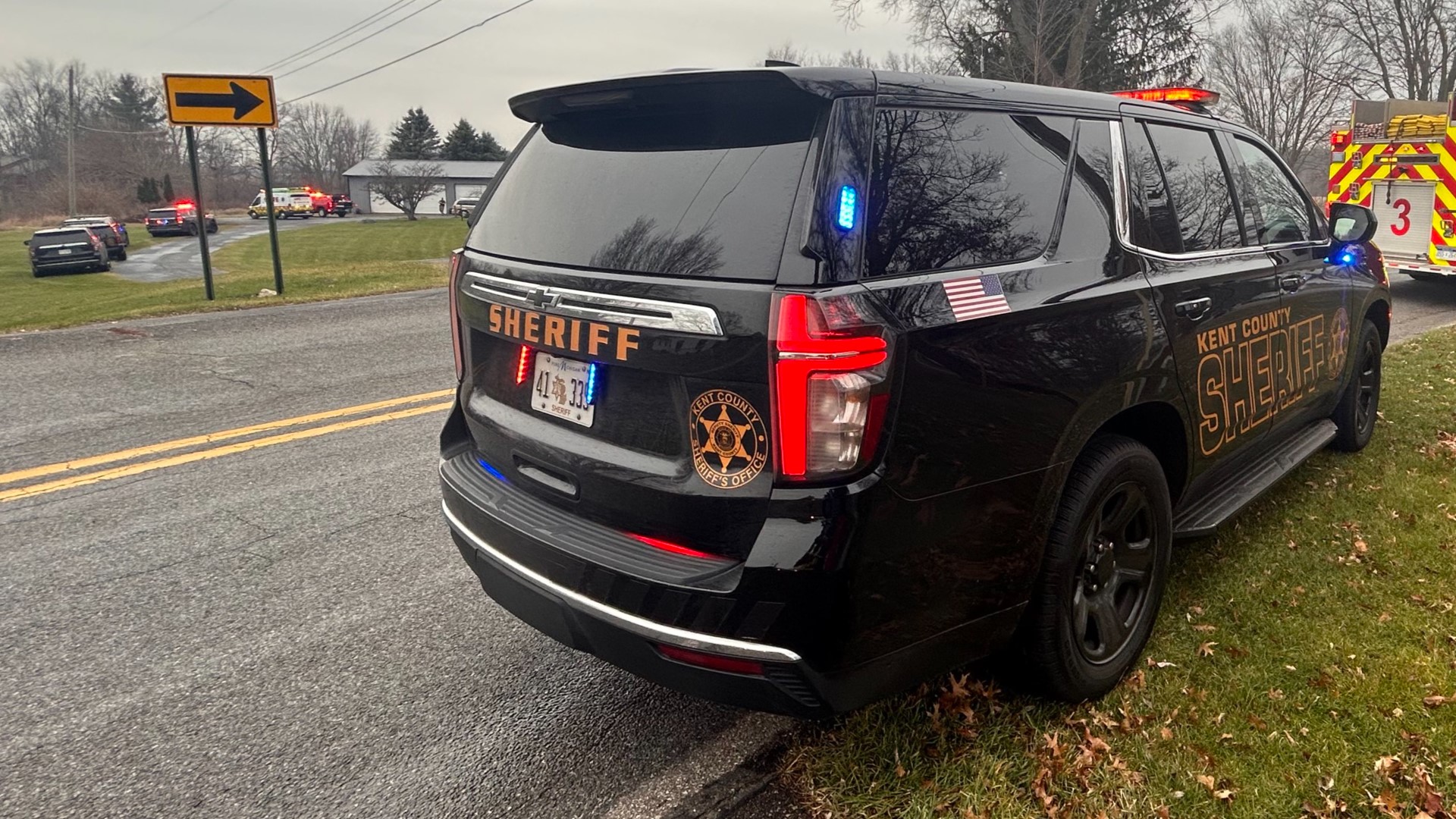KENT COUNTY, Mich. — The Kent County Sheriff's Office confirmed with 13 ON YOUR SIDE that a faulty boiler vent was likely the cause of a family found dead of suspected carbon monoxide poisoning Friday afternoon.
The Kent County Sheriff's Office said 911 dispatchers got calls Friday afternoon from some distraught family members who hadn't heard from their loved ones for some time.
When they went to their home in the 4800 block of Stage Avenue NW, which is between 6 Mile and 5 Mile Road, the family members found them dead inside.
Authorities said the investigation is preliminary, but the first responders on scene got high carbon monoxide (CO) levels inside the home.
First responders had to ventilate the home before deputies could make their way inside.
A husband and wife, both in their 80s, along with their son in his 60s have died. The husband was 86 years old, the was wife 81 years old and their son was 61 years old.
The Kent County Medical Examiner will determine their official cause of death. First responders on the scene speculated their deaths were related to carbon monoxide.
"It's a very tragic thing. Our hearts really go out to this family. It's family approaching Christmas, and now this family has to plan three funerals," Kent County Sheriff's Department Sgt. Eric Brunner said.
The Sheriff's Office and other first responders want to use this as a stark reminder about the dangers of carbon monoxide. Know there are steps you can take to protect yourself and your family.
In the case of a power outage, follow these important life-saving tips:
- NEVER operate a portable generator inside a home, garage, basement, crawlspace or shed. Opening doors or windows will not provide enough ventilation to prevent the buildup of lethal levels of CO.
- Operate portable generators outside only, at least 20 feet away from the house, and direct the generator’s exhaust away from the home and any other buildings that someone could enter, while keeping windows and other openings closed in the path of the generator’s exhaust. Do not operate a generator on an outside porch or in a carport. They are too close to the home.
- Check that portable generators have been maintained properly, and read and follow the labels, instructions, and warnings on the generator and in the owner’s manual.
- Look for portable generators that have a CO shut-off safety feature, which is designed to shut the generator off automatically when high levels of CO are present around the generator. These models may be advertised as certified to the latest safety standards for portable generators–PGMA G300-2018 and UL 2201–which are estimated to reduce deaths from CO poisoning by 87% and 100%, respectively. UL 2201 certified models have reduced CO emissions in addition to the CO shut-off feature.
Check CO and Smoke Alarms
- Working smoke and CO alarms save lives! Install battery-operated CO alarms or CO alarms with battery backup on each level and outside separate sleeping areas at home. Interconnected CO alarms are best; when one sounds, they all sound.
- Make sure smoke alarms are installed on every level and inside each bedroom at home.
- Test CO and smoke alarms monthly to make sure they are working properly, and replace batteries, if needed. Never ignore an alarm when it sounds. Get outside immediately. Then call 911.
- Clear snow away from the outside vents for fuel-burning appliances such as furnaces so that dangerous carbon monoxide does not build up in the house.
Dangers with Portable Heaters
- Keep all sides of the portable heater at least 3 feet from beds, clothes, curtains, papers, sofas and other items that can catch fire.
- ALWAYS use a wall outlet; NEVER a power strip and NEVER run the heater’s cord under rugs or carpeting.
- Make sure the heater is not near water. NEVER touch it if you are wet.
- Place the heater on a stable, level surface, located where it will not be knocked over.
- NEVER leave running unattended in a confined space to reduce hyperthermia hazards.
- If the heater’s cord or plug is HOT, disconnect the heater and contact an authorized repair person. If any part of the outlet is hot, contact a certified electrician.
Dangers with Charcoal and Candles
- NEVER use charcoal indoors. Burning charcoal in an enclosed space can produce lethal levels of CO. Do not cook on a charcoal grill in a garage, even with the door open.
- Use caution when burning candles. Use flashlights instead. If using candles, do not burn them on or near anything that can catch fire. Never leave burning candles unattended. Extinguish candles when leaving the room and before sleeping.
Dangers with Gas Leaks:
- If you smell or hear gas leaking, leave your home immediately and contact local gas authorities from outside the home. Do not operate any electronics, such as lights or phone, before leaving.
►Make it easy to keep up to date with more stories like this. Download the 13 ON YOUR SIDE app now.
Have a news tip? Email news@13onyourside.com, visit our Facebook page or Twitter. Subscribe to our YouTube channel.
Watch 13 ON YOUR SIDE for free on Roku, Amazon Fire TV Stick, Apple TV and on your phone.

